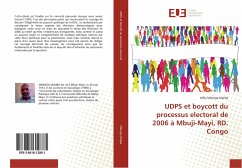
The case of Evangelical President Thomas Boni Yayi of Benin (2006-2016)
Versandkostenfrei!
Versandfertig in 6-10 Tagen
68,99 €
inkl. MwSt.

PAYBACK Punkte
34 °P sammeln!
This thesis examined Boni Yayi's leadership as head of state from 2006 to 2016. Driven by a desire to lay the foundations for integral development and to restore the state's "social utility," he exercised generally positive leadership on the institutional and human rights fronts, and significant social advances and diplomatic successes were achieved. But overall, it has not been able to promote the integral development that is its ultimate goal. Thus, it has failed in the fight against corruption, its policy of promoting women and especially its policy of economic emergence. In addition, his r...
This thesis examined Boni Yayi's leadership as head of state from 2006 to 2016. Driven by a desire to lay the foundations for integral development and to restore the state's "social utility," he exercised generally positive leadership on the institutional and human rights fronts, and significant social advances and diplomatic successes were achieved. But overall, it has not been able to promote the integral development that is its ultimate goal. Thus, it has failed in the fight against corruption, its policy of promoting women and especially its policy of economic emergence. In addition, his regime has left massive unemployment and great poverty. The study identified as factors of failure: authoritarian embodiment of leadership, character deficiencies, including a weak temperance, with a directive style of decision-making characterized by the absence of verification of information and the virtue of foresight, weaknesses in strategic skills. In addition to these factors, there is a poor work climate, management by fear of subordinates through untimely reshuffles, constant dismissals.












